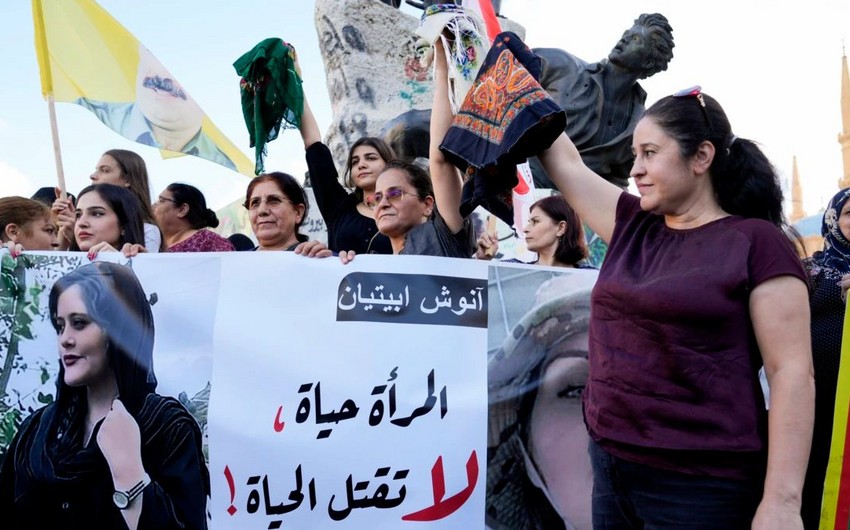CNN has prepared a special report on how Iranian security forces use rape to suppress protests, Report informs referring to the channel.
One Kurdish-Iranian woman, whom CNN is calling Hana for her safety, says she both witnessed and suffered sexual violence while detained. “There were girls who were sexually assaulted and then transferred to other cities,” she said. “They are scared to talk about these things.”
In recent weeks, social media videos have emerged allegedly showing Iranian security forces sexually assaulting female demonstrators on the streets. Reports of sexual violence against activists in prisons began to surface.
With media access inside Iran severely constrained, CNN went to the region near Iraq’s border with Iran, interviewing eyewitnesses who'd left the country and verifying accounts from survivors and sources both in and outside Iran. CNN corroborated several reports of sexual violence against protesters and heard accounts of many more. At least one of these caused severe injury, and another involved the rape of an underage boy. In some of the cases CNN uncovered, the sexual assault was filmed and used to blackmail the protesters into silence, according to sources who spoke to the victims.
Hana, a Kurdish-Iranian woman in her 20s, undertook a perilous journey along mountain paths to avoid the official crossing, fleeing Iran days after she says she was sexually assaulted in police custody.
Before Hana was arrested, she had been warned that women in Iranian prisons were “being treated very badly.” Her mother received a phone call from her neighbor - a high-level official in Mahabad prison in the country’s northwest — urging her to not let her daughters out of their home “under any circumstances,” Hana tells CNN.
Hana says she was undeterred. She joined the protests and, like many other female demonstrators, she spun around and danced as she waved her headscarf in the air before burning it, in what has become a ritualistic feature of the nationwide protests.
When she was arrested, Iranian police said they saw her torching her scarf in surveillance footage, she says.
Hana says she was held in a detention center at a police station in Iran’s northwestern city of Urmia for 24 hours. Hana sketched the layout of the holding center, where she says police abused detained protesters. There was a main hall with private interrogation rooms off it, she says. “An officer would take a pretty girl, and he would go to a room to be alone with her and sexually assault her.”
CNN was able to locate the police station through Hana’s description, eyewitness corroboration and geolocation using key landmarks.
Unlike most of her fellow activists, Hana fled Iran. For days, she and her uncle’s family followed a group of Kurdish smugglers as they weaved through the border region’s mountains. Only a handful of protesters have embarked on the perilous journey. That’s because the Iranian side of the border is heavily militarized, and security forces regularly shoot-to-kill those who cross, and smuggle goods, illegally.
Other women were not so lucky, she says. Many of those held at the station were denied bail and disappeared into a labyrinthine prison system which includes secret detention centers in military bases, according to sources and rights groups.
Armita Abbasi, 20, bore all the hallmarks of a Gen Z-er. Her edgy hairdo was dyed platinum blonde and she had an eyebrow piercing. She wore colored contact lenses, and filmed TikToks with her cats from her living room.
The uprising changed her life, and Iran’s security forces appear to have subjected her to some of the worst of their brutality.
She was arrested in her hometown of Karaj, just west of Tehran, nearly a month after the onset of the demonstrations. In an October 29 statement, the government claimed she was “the leader of the riots” and that police discovered “10 Molotov cocktails” in her apartment.
On October 17, Abbasi was rushed to the Imam Ali hospital in Karaj, accompanied by plainclothes officers, according to leaks from that hospital. Her head had been shaved and she was shaking violently. In the accounts, the medical staff attending to her spoke of the horror they felt when they saw evidence of brutal rape.
Abbasi is currently being held in Karaj’s notorious Fardis prison, according to the Iranian government. CNN has been unable to reach her or her family members for comment.


 https://static.report.az/photo/8aafd67a-3a87-3be5-a542-a4184a9e0016.jpg
https://static.report.az/photo/8aafd67a-3a87-3be5-a542-a4184a9e0016.jpg

